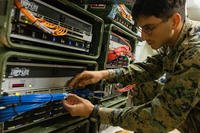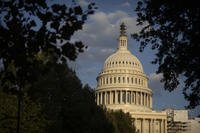As novel coronavirus cases rise, some 2,050 citizen soldiers and airmen have been activated by state governors, and that number will likely double by the weekend, the head of the National Guard Bureau told defense reporters at the Pentagon on Thursday.
Air Force Gen. Joseph Lengyel said he expects tens of thousands of Guardsmen to be called up over the coming weeks.
Governors in 27 states have activated parts of their National Guard units to counter the effects of the contagious virus, known as COVID-19, with medical testing, transportation, logistics support and, potentially, law enforcement responsibilities, he said.
"It's hard to tell what the exact requirement will be," Lengyel added, "but I am expecting tens of thousands [of Guard members] to be used inside the states as this grows, and I think states have the capacity to do those kinds of things."
Related: A Soldier Compared Coronavirus Quarantine to Prison. Pentagon Vows to 'Do Better'
Lengyel described the pandemic as a "historic event unlike any we have faced in recent years."
"When there is a hurricane, you can see it on a map; you have a sense of how hard the storm will hit and how long the story will last," he said. "With COVID-19, it's like we have 54 separate hurricanes, [one] in every state, territory and the District of Columbia."
But for now, there is no plan to federalize Guard personnel on active-duty status, he stressed to reporters.
If President Trump "wanted to mobilize the National Guard under Title 10 federal status, he could do that," Lengyel said. "But that would not make sense in this situation. The best use of the National Guard is to use the National Guard for the unique authorities that it has, and that is to remain under the command and control of the networks within the states.
"If you mobilize all of the National Guard, it's going to cost billions and billions and billions of dollars, and a lot of people won't have things to do," he said. "There is no need right now to have 450,000 Guardsmen on duty."
The Guard is "uniquely qualified and postured to act under the command and control of the governors in the states and so, if you were to federalize them, you would lose that ability," Lengyel added.
He cited the Posse Comitatus Act of 1878, which prohibits active-duty military personnel from being used as law enforcement.
"If you keep the National Guard under the command and control of their governor, in what we call Title 32 or state active-duty status, they have additional authorities that can assist law enforcement," Lengyel said. "If you were to federalize the National Guard, then you would lose that ability."
If the situation requires it, governors can order the Guard to assist with police patrols and enforce laws -- "anything that the law enforcement capacity normally does, they could be augmented with National Guard troops," he explained.
"Do I see it happening now? I don't see any demand signal that's demanding that we are going to use the National Guard in that kind of scenario, but they could," Lengyel said. "Governors could under the command and control of law enforcement in their states, they could use their National Guard."
-- Matthew Cox can be reached at matthew.cox@military.com.
Read More: More COVID-19 coverage














